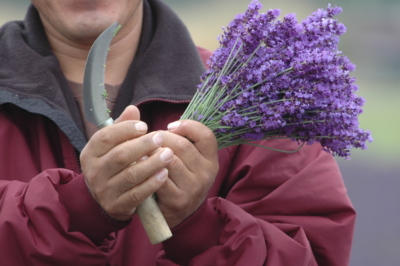With lavender is to catch the right time for a harvest. This point can appear in early summer, depending on the variety. For the highest possible quality of lavender flowers is also important that they are properly dried. Lavender bushes in the first year do not yet produce too many flowers, really lush growth usually begins from about the third year of standing. Then you can get up to 10 – and sometimes even more – lavender bunches per bush.

Harvest lavender before it really blossoms.
In this regard, lavender bunch is considered to be what fits comfortably in your closed fist. Lavender should be harvested before it has reached its full flowering peak. You can tell the right time to harvest by the fact that the flowers in the center of the panicle have already opened, while other buds remain closed. This is usually the case between mid-July and early August. Lavender flowers are best cut in the midday sun, as any morning moisture will have dissipated by then. Damp leaves in particular can cause the lavender to mold instead of drying.
Lavender is pruned during the harvest
When you harvest the lavender, you do not need to prune it afterwards – after all, it is one and the same process. However, you should not prune the inflorescences later than the beginning of August, because after that the lavender needs its strength to survive the winter. Summer pruned lavender often develops a second flower, but in our latitudes lavender from August lacks time for this – the cut surfaces of the removed shoots then simply freeze away.
- Harvest lavender properly
- Follow these steps when harvesting lavender:
First, take a close look at your lavender plant. Where is the shrub already woody, where are the green shoots starting?
Using a sharp knife or scissors, cut the stems just above the woody part, so that you shorten the lavender by about a third.
Prune the lavender right away so that it has an even shape.
Pruning is important so that new flowers can form.
Lavender that is not pruned becomes woody over the years and produces fewer and fewer flowers.
Drying lavender
To dry, tie the lavender into bunches and tie them tightly with a rubber band. Finally, hang the bundles upside down in a warm, dry and, most importantly, dark place – an attic or garden shed ($399.00 on Amazon*) are ideal. Optionally, you can also spread the stems on grids – the only important thing is that the air can circulate well. The sunlight must not be high, otherwise the sensitive essential oils will volatilize. To dry, leave the stem still on. The flowers are well dried as soon as they can be easily wiped off.
Tips & Tricks
Not only the flowers, but also the delicate lavender leaves can be used to flavor numerous dishes, especially savory ones. However, if possible, use only the very young leaves, because the older ones have a rather unpleasant soapy aroma.

